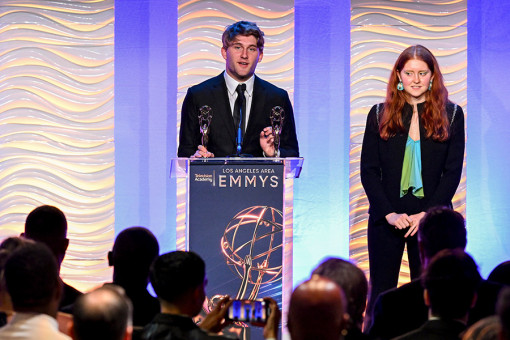It's been said that the only constant in life is change. The same holds true for the television industry. To provide members an inside perspective on the current state of the industry, the Television Academy gathered a panel of prominent television figures to share their insights and perspectives on a wide range of topics.
Held February 28 at the Saban Media Center in the NoHo Arts District, the event — titled "A Frank Conversation ... about the State of the Business" both for its candor and for its moderator, Academy chair and CEO Frank Scherma — packed the Wolf Theatre with members eager to listen and learn.
Watch the replay of this event.
Participating were Casey Bloys, chairman and CEO, HBO and HBO Max Content; Gloria Calderón Kellett, award-winning writer, executive producer, director and actress; Craig Erwich, President, Disney Television Group; and Pearlena Igbokwe, chairman, Universal Studio Group.
With so much content and so many ways of viewing, defining one's brand is essential.
"[Brands] are instruments to help people make choices — not just the audience, but the executives," Erwich said. "You get pitched. And you're presented with a lot of options. Brands are your filter and operating systems to help make decisions. And I think the creative strategy or values of a brand need to be connected to the business that they're attached to. So, ABC is a broadcast network. And that has a different business model and serves a different role in people's lives than [on-demand streaming platform] Hulu."
Continuing, he added: "I think people look to ABC more for aspiration. It's a welcoming brand that has kind of a warmth and a hopefulness to it; it's not saccharine."
As HBO customers have always expected to pay for programming, the key to the network's content is, "Does this feel like it's worth paying for?" Bloys said. "Does it feel different? Does it feel special?"
On the studio side, Igbokwe said, "We want to be known as a place that is the home for the best storytellers and the best in what they're doing. We need to be in business with people who have a very clear and distinctive brand [and] point of view." People know, for instance, what Dick Wolf, Jordan Peele and Tina Fey stand for, she noted.
As a creator, Kellett, best known for her 2017-2020 updating of One Day at a Time with a Cuban-American family, specializes in pop-culture, broad-appeal stories centered around Latinos. "'[Writers] have to be specific about, what do we bring to the table? What do we think we can do better than anybody else?" she said.
Kellett believes in sharing her knowledge and experience with other writers who want to become showrunners; with so many shows and short-order runs, there is currently a shortage of showrunners despite industry training programs. Other panelists could see adopting her method of inviting writers to observe meetings and have lobbied for having writers produce their episodes. And, Erwich said, there should be training programs for future executives, as well.
A twenty-four-episode season order used to be the norm, Bloys pointed out, to produce enough series episodes over time for the lucrative syndication market. As there's no syndication with streaming, that marketplace has changed, so there needs to be some other incentive to produce series with the kind of extensive libraries that shows such as Friends and The Office bring to streamers. Perhaps that's the streamers themselves: the streaming rights to the CBS comedy Ghosts, Igbokwe noted, were auctioned after its first season because of the anticipation of a large-volume library. And, high-volume shows, Erwich added, come pre-marketed, as audiences have already seen or heard about them.
With so many streaming services now to choose from — and pay for — the panelists believe that sometime in the future, consumer interest will consolidate the numbers to three to five global services, with perhaps some niche platforms also popping up. With the shift in viewing from linear television to digital, "the internet has transformed many businesses and lots of ways of life," Bloys said. "Television is no different."














